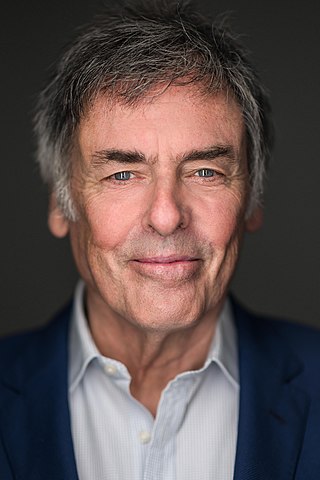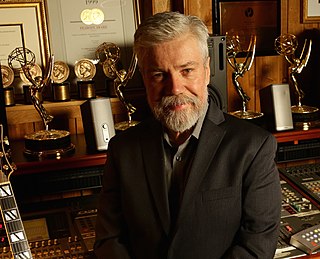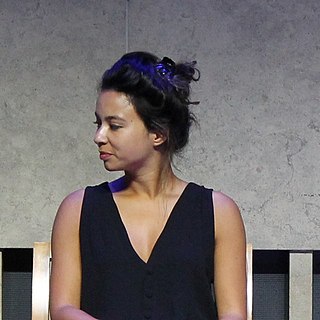Related Research Articles
Frontline is an investigative documentary program distributed by the Public Broadcasting Service (PBS) in the United States. Episodes are produced at WGBH in Boston, Massachusetts. The series has covered a variety of domestic and international issues, including terrorism, elections, environmental disasters, and other sociopolitical issues. Since its debut in 1983, Frontline has aired in the U.S. for 39 seasons, and has won critical acclaim and awards in broadcast journalism. In 2024 Frontline won its first Oscar at the 96th Academy Awards for Best Documentary Feature, "20 Days in Mariupol," made by a team of AP Ukrainian journalists. Frontline has produced over 750 documentaries from both in-house and independent filmmakers, 200 of which are available online.
Nigel Sinclair, CBE is a Scottish producer of Hollywood films.
Brian Edwards is a BAFTA award-winning British documentary filmmaker, who founded and currently runs True Vision, an independent production company, which concentrates mainly on human rights-related subjects. Through the company he has been awarded or nominated for several international awards, including six US Emmies, a BAFTA, two US Peabodies, The Amnesty International Documentary Award, two One World Awards, and three Monte Carlo TV Festival Awards. The company's films have been commissioned by the BBC, Channel 4, Discovery and HBO, and have been shown around the world.
Kate Blewett is a documentary film-maker in the United Kingdom. She is best known for her documentaries on human rights abuses, such as The Dying Rooms and Bulgaria's Abandoned Children.

Independent Lens is a weekly television series airing on PBS featuring documentary films made by independent filmmakers. Past seasons of Independent Lens were hosted by Angela Bassett, Don Cheadle, Susan Sarandon, Edie Falco, Terrence Howard, Maggie Gyllenhaal, America Ferrera, Mary-Louise Parker, and Stanley Tucci, who served two stints as host from 2012-2014.

Jamie Doran is an Irish-Scottish independent documentary filmmaker and former BBC producer. He founded the multi award-winning company Clover Films, based in Windsor, in 2008. He is also the Club President of Datchet Village FC, which he founded in 1986. Doran's films are shown worldwide and on series such as BBC's Panorama, Channel 4's Dispatches, Channel 4's True Stories, PBS's Frontline, Al Jazeera, ABC's Four Corners, Japan's NHK, Germany's ZDF NDR/ARD and Denmark's DR.
Thomas Furneaux Lennon is a documentary filmmaker. He was born in Washington, D.C., graduated from Phillips Exeter Academy in 1968 and Yale University in 1973.

Martyn Burke is a Canadian director, novelist and screenwriter from Toronto, Ontario.

Bill Lichtenstein is an American print and broadcast journalist and documentary producer, president of the media production company, Lichtenstein Creative Media, Incorporated.
Joshua Seftel is an Academy Award-nominated film director. Seftel began his career in documentaries at age 22 with his Emmy-nominated film, Lost and Found, about Romania's orphaned children. He followed this with several films including Stranger at the Gate, an Oscar-nominated short documentary executively produced by Nobel Peace Prize laureate Malala Yousafzai. His political campaign film Taking on the Kennedys was selected by Time Magazine as one of the “ten best of the year." Seftel also directed the underdog sports film The Home Team which premiered at SXSW, and a film about the Broadway revival of the musical Annie, It's the Hard Knock Life.

Michael Kirk is a documentary filmmaker and partial creator of the PBS show Frontline, where he worked as senior producer until 1987. Kirk founded and currently owns the production company, the Kirk Documentary Group, in Brookline, Massachusetts, which has produced dozens of award-winning documentaries, both for Frontline and through his company, that focus on political, social and cultural issues.

Brian Keane is an American composer, music producer, and guitarist. Keane has been described as "a musician's musician, a composer's composer, and one of the most talented producers of a generation" by Billboard magazine.

Sheila Nevins is an American television producer and head of MTV Documentary Films division of MTV Studios. Previously, Nevins was the President of HBO Documentary Films. She has produced over 1,000 documentary films for HBO and is one of the most influential people in documentary filmmaking. She has worked on productions that have been recognized with 35 News and Documentary Emmy Awards, 42 Peabody Awards, and 26 Academy Awards. Nevins has won 31 individual Primetime Emmy Awards, more than any other person. She is also a member of the board of directors for the Peabody Awards.

Raney Aronson-Rath produces Frontline, PBS's flagship investigative journalism series. She has been internationally recognized for her work to expand the PBS series' original investigative journalism and directs the editorial development and execution of the series. Aronson-Rath joined Frontline in 2007 as a senior producer. She was named deputy executive producer by David Fanning, the series’ founder, in 2012, and then became executive producer in 2015.
Marion "Muffie" Meyer is an American director, whose productions include documentaries, theatrical features, television series and children’s films. Films that she directed are the recipients of two Emmy Awards, CINE Golden Eagles, the Japan Prize, Christopher Awards, the Freddie Award, the Columbia-DuPont, and the Peabody Awards. Her work has been selected for festivals in Japan, Greece, London, Edinburgh, Cannes, Toronto, Chicago and New York, and she has been twice nominated by the Directors Guild of America.
Richard Rowley is a documentary filmmaker. His films and TV shows have received three Emmy awards, an Oscar nomination, and other awards and nominations, as well as recognition at film festivals around the world.

Amy Schatz is an American director and producer of documentaries and children's shows and series.

Isobel Yeung is a British long-form documentary senior correspondent. She has covered a variety of stories concerning major global issues such as ongoing world conflicts, terrorism, mass detention, and genocide. She has also reported on social issues in developing countries such as gender roles, women's rights, mental health and corruption. Her work has earned her two Emmy Awards and a Gracie Award.

Nancy Florence Buirski was an American filmmaker, producer, and photographer. She wrote, directed, and produced the documentary films A Crime on the Bayou (2020) and Desperate Souls, Dark City and the Legend of Midnight Cowboy (2022).
Jacoba Atlas is an American executive producer in television, also publishing as a journalist, music critic, novelist, screenwriter and documentary filmmaker. She won a Peabody Award, an Emmy Award and a CableACE Award for Survivors of the Holocaust (1996), a TV documentary made for TBS.
References
- ↑ "Keep up pressure over "dying rooms", urges TV producer". The Irish Times. Retrieved 14 September 2018.
- ↑ Thurston, Anne F. (1 April 1996). "In a Chinese Orphanage". The Atlantic. Retrieved 14 September 2018.
- 1 2 "British filmmaker KATE BLEWETT". NPR.org. Retrieved 14 September 2018.
- 1 2 3 Tyler, Patrick E. (21 January 1996). "TELEVISION;In China's Orphanages, a War of Perception". New York Times. Retrieved 14 September 2018.
- ↑ "The Dying Rooms". The Peabody Awards. Retrieved 14 September 2018.
- ↑ "'Lost' childhood // Film shows cruelty to boys and girls". Chicago Sun-Times. 11 June 1998. Archived from the original on 15 September 2018.
- ↑ "THE 17TH ANNUAL NEWS AND DOCUMENTARY EMMY AWARDS PRESENTED BY THE NATIONAL ACADEMY OF TELEVISION ARTS AND SCIENCES" (PDF). NATIONAL ACADEMY OF TELEVISION ARTS AND SCIENCES.
- ↑ Volkman, Toby Alice (2005). Cultures of transnational adoption. Duke University Press. p. 186. ISBN 9780822335764.
- ↑ "The Description and Accusations About China's Children's Welfare Institutions by Britain's Channel Four and the Human Rights Watch/Asia Do Not Hold Water". People's Daily Online. Retrieved 14 September 2018.
- ↑ Hilsdon, Anne-Marie; Macintyre, Martha; Mackie, Vera; Stivens, Maila (12 November 2012). Human Rights and Gender Politics: Asia-Pacific Perspectives. Routledge. p. 98. ISBN 9781135117870.
- ↑ "CHINA'S CHILDREN". The Irish Times. Retrieved 14 September 2018.
- ↑ Goodman, Walter (24 January 1996). "TELEVISION REVIEW;The Film at the Root of the Outcry Over Orphans". The New York Times. Retrieved 14 September 2018.